"ENERGY" DRINKS
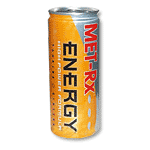 |
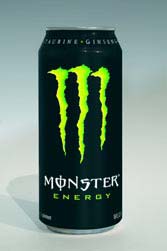 |
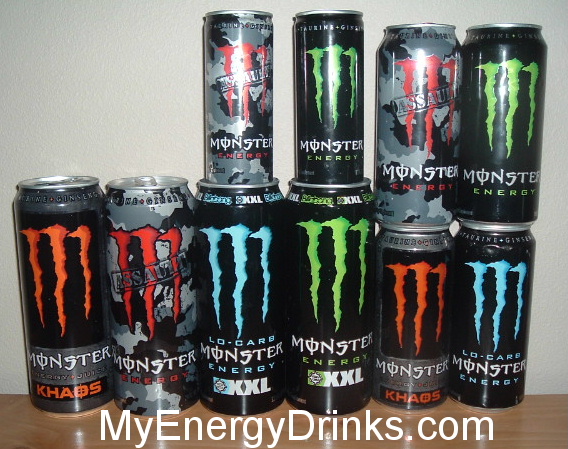 |
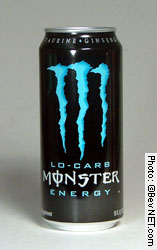 |
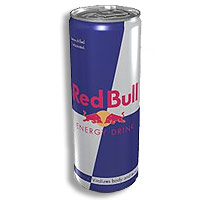 |
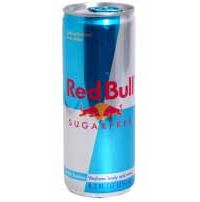 |
"ENERGY" DRINKS
 |
 |
 |
 |
 |
 |
What are Energy Drinks?
Energy drinks are canned or bottled beverages sold in convenience stores, grocery stores, and bars and nightclubs (in mixed drinks). Most energy drinks are carbonated drinks that contain large amounts of caffeine and sugar with additional ingredients, such as B vitamins, amino acids (e.g. taurine), and herbal stimulants such as guarana.
Energy drinks are marketed primarily to people between the ages of 18 and 30 as a stimulant, which is why energy drinks have names that convey strength, power, and speed, and sexuality, such as:
Energy Drinks Contain Caffeine
Red Bull, one of the most popular energy drinks, contains nearly 80 mg of caffeine per can, about the same amount of caffeine as a cup of brewed coffee and twice the caffeine as a cup of tea. Other energy drinks contain several times this amount. Usually one can is listed as more than one serving size, thus the caffeine content is triplied. Also, the amount of caffeine in an energy drink isn't always indicated on the label, so it is difficult to gauge how much one is consuming.
Another problem with energy drinks is that unlike hot coffee or tea, which is sipped slowly, it's common for typical energy drink consumers to drink large amounts quickly.
Some people are sensitive to caffeine and experience anxiety, palpitations, irritability, difficulty sleeping, and indigestion with relatively small amounts. People with heart conditions should avoid large amounts of caffeine, because it is a stimulant.
The Combination of Ingredients in Energy Drinks Has Not Been Studied
One of the biggest concerns is that we just don't know enough about the effect of the combination of ingredients in energy drinks. Many ingredients are believed to work synergistically with caffeine to boost its stimulant power.
For instance, one can of Red Bull contains 1000 mg of taurine. A German double-blind study compared a taurine and caffeine drink, a caffeine-only drink, and a placebo drink. Stroke volume--the volume of blood ejected with each beat of the heart--was increased only in the group taking the taurine-and-caffeine drink. Taurine appears to play an important role in muscle contraction (especially in the heart) and the nervous system.
Red Bull also contains 600 mg of glucuronolactone, a substance that is naturally found in the body. There is a lack of published information on the health effects of glucuronolactone supplementation in humans or on the safety of this combination.
Energy drinks contain sugar (although sugar-free energy drinks are now available), because it is a quick source of energy.
B vitamins are sometimes added to energy drinks in small amounts. It makes energy drinks appear healthy, although they probably contribute little. B vitamins are needed to convert food into energy.
Some energy drinks contain guarana, a South American herb that is an additional source of caffeine.Introduction
In the past few years, "energy" drinks, such as Red
Bull, Whoopass, Speed Stack, Venom, Piranha, and Amp, have become
quite popular with children and adolescents. The buzz these
drinks provide comes mainly from caffeine and sugar, as many as
five teaspoons in a small can. However, some drinks load
up on herbs like ma huang, gingseng, green tea, taurine, or guarana, marketing
themselves as "natural" alternatives, despite the fact
that ma huang is a form of the drug ephedrine, taurine is a sulfonic amino acid and guarana a strong stimulant.
Dr. Wilke Wilson, a professor of Pharmacology at Duke University Medical Center, cautions that there is "very little research" on the health effects of caffeine, ephedrine, and similar stimulants on young people. "I have a lot of concerns because the brain is still growing," he says. "The human brain is wiring itself up to around age 21. Anything like this can affect a growing brain, but we don't know how."
Dr. Roland Griffiths, a professor in psychiatry and neuroscience at Johns Hopkins University and one of the world's leading caffeine researchers, says, "We're now seeing very aggressive marketing of caffeine products to kids. A lot of parents are unaware that caffeine is a drug and needs to be accorded respect as a drug."
-excerpted from "Should Kids Use 'Energy Drinks?' Should Anyone?" by Todd Morman, Spectator Magazine, March 13, 2002
Consumption of energy drinks has been associated with fainting and sudden death during strenuous workouts or when consumed with alcohol.
Energy Drinks Should Not Be Mixed With Alcohol
Red Bull and vodka has become a popular mixed drink at bars because it has a reputation for reducing the depressant effects of alcohol (e.g. fatigue) while enhancing the "feel good" buzz. But while people may not feel impaired, their blood alcohol concentration is still high. Thus, people may consume larger amounts of alcohol as a result causing increased risk of alcohol poisoning.
A study compared the effects of alcohol alone to an alcohol plus energy drink combination. Researchers found that the alcohol, plus energy drink significantly reduced subjective alcohol-related symptoms such as headache, weakness, dry mouth, and impairment of motor coordination, even though breath alcohol concentration and objective tests of motor coordination and reaction time didn't reflect this.
The caffeine in energy drinks is also dehydrating, which may slow the body's ability to metabolize alcohol.
Energy Drinks Should Not Be Consumed During Exercise
Energy drinks should not be confused with sports drinks such as Gatorade, which are consumed to help people stay hydrated during exercise. Sports drinks also provide carbohydrates in the form of sugar and electrolytes that may be lost through perspiration.
The caffeine in energy drinks acts as a diuretic and promotes dehydration.
* Manufacturers that produce Red Bull, Monster, Rock Star, etc. have taken the high sugar and carbohydrate content into consideration by making sugar free and lo carb energy drinks, if you must drink them then try the sugar free or lo carb instead.
The following are the warning labels on products containing ephedrine.
U.S. Federal Trade Commission
Warning
For products containing ephedra or ephedrine. Taking more than
the recommended serving may result in heart attack, stroke, seizure
or death. Consult a health care practitioner prior to use if you
have high blood pressure, heart or thyroid disease, diabetes,
difficulty urinating, prostate enlargement, or glaucoma, or are
using any prescription drug. Do not use if you are taking a MAO
inhibitors or any allergy, asthma, or cold medication containing
ephedrine, pseudoephedrine, or phenylpropanolamine. Discontinue
use if dizziness, sleeplessness, loss of appetite, or nausea occurs.
American Herbal Products
Association (AHPA)
Recommendations for consumer products containing ephedra.
WARNING: Not intended for use by anyone under the age of 18. Do
not use this product if you are pregnant or nursing. Consult a
health care professional before using this product if you have
heart disease, thyroid disease, diabetes, high blood pressure,
depression or other psychiatric condition, glaucoma, difficulty
in urinating, prostate enlargement, or seizure disorder, if you
are using a monoamine oxidase inhibitor (MAOI) or any other prescription
drug, or you are using an over-the-counter drug containing ephedrine,
pseudoephedrine or phenylpropanolamine (ingredients found in certain
allergy, asthma, cough/cold and weight control products).
Exceeding recommended serving will not improve results and may
cause serious adverse health effects. Discontinue use and call a health care professional immediately
if you experience rapid heartbeat, dizziness, severe headache,
shortness of breath, or other similar symptoms.
Test Your Tolerance
It is advised that you start with less than the recommended dosage.
Take it with a meal to test your tolerance of the product before
increasing to the recommended dosage. Do not take more than one
product at a time containing any central nervous system stimulants.
Do not take with any prescription drugs or over the counter medicine.
Check with you physician prior to use. If you experience bad side
effects, discontinue use immediately and consult a physician.
It is noted that the average adult can consume 400mg of caffeine daily without adverse effects; however, children and nursing mothers should not consume more than 300mg per day.
Disclaimer: This information is not intended be a substitute for professional medical advice. It is provided for educational purposes only. You assume full responsibility for how you choose to use this information.